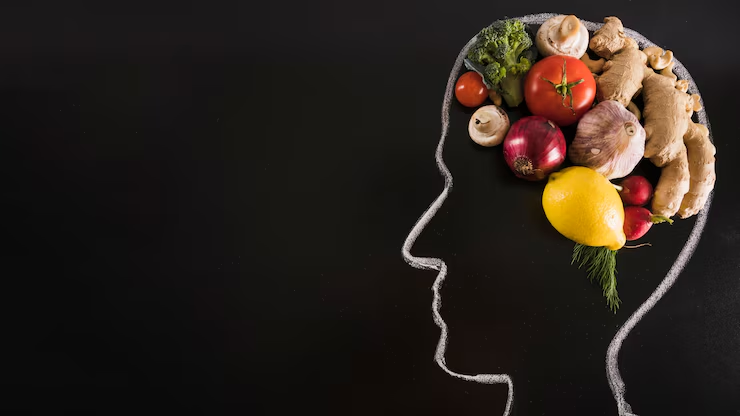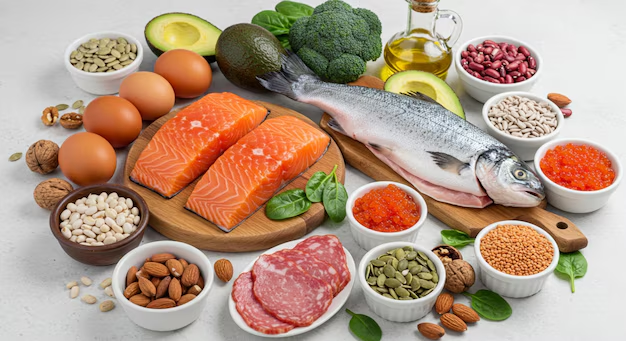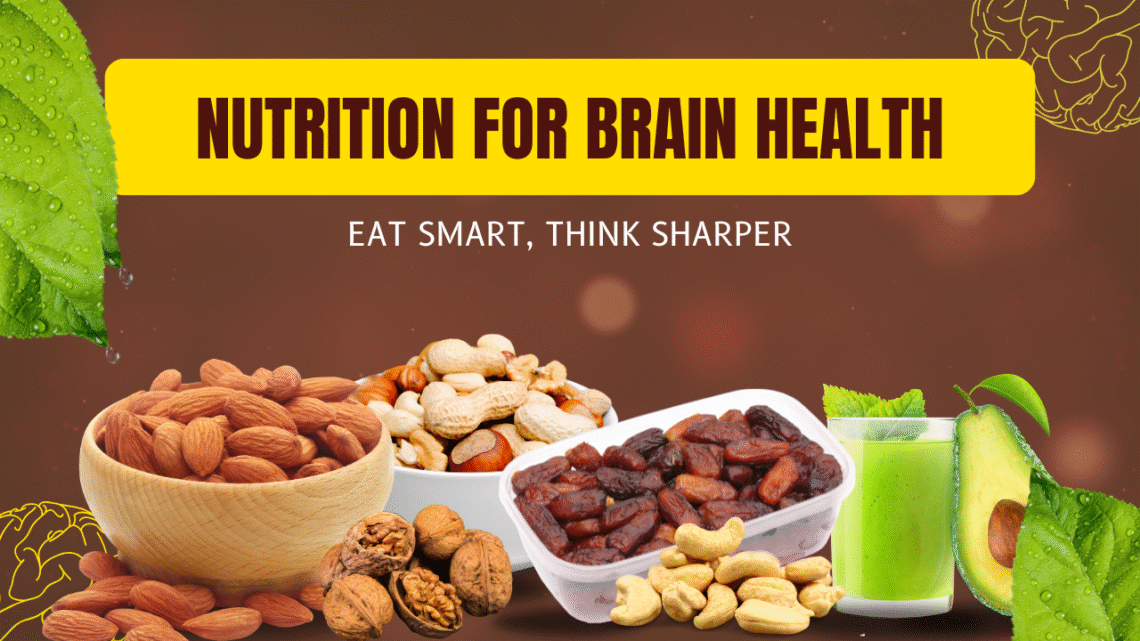The human brain is a marvel—controlling everything from our thoughts and emotions to movement, memory, and decision-making. To function optimally, it demands proper care and, most importantly, the right nutrition. While genetics and lifestyle certainly play roles, the food we eat directly impacts brain performance, cognitive decline, mood, and mental clarity.
With the rise of neurodegenerative conditions like Alzheimer’s, Parkinson’s, and dementia, understanding how nutrition affects brain health has never been more vital. In this comprehensive guide, we will explore everything about brain-supporting foods and share 8 powerful nutrition tips to boost your brain function naturally.
Understanding the Brain-Nutrition Connection
The human brain is remarkably energy-intensive—it represents just about 2% of body weight, yet it consumes around 20% of the body’s calories and oxygen while at rest. This consistent high energy demand fuels even our most basic, unconscious brain functions and is essential to maintain synaptic activity and neural communication .

All this energy comes from the food we eat, so what we consume directly influences nutrition for brain health—affecting neuronal structure, neurotransmitter production, and the function of the blood-brain barrier. For example, omega‑3 fatty acids, antioxidants, B vitamins, and amino acids support membrane integrity, hormone synthesis, and neurotransmission. Without these nutrients, brain cell membranes can weaken and neurotransmitter imbalances may occur.
Additionally, the blood–brain barrier acts as a gatekeeper, controlling nutrient and oxygen access to the brain while blocking harmful substances. Ensuring your diet includes nutrient-rich foods that cross this barrier—like choline, glucose, and essential vitamins—is vital for supporting cognitive performance, memory, and long-term brain resilience.
Key Nutrients for Brain Function:
- Omega-3 fatty acids – build brain cell membranes and reduce inflammation.
- Antioxidants – protect the brain from oxidative stress and aging.
- B vitamins – support energy metabolism and nerve health.
- Amino acids – form neurotransmitters like serotonin and dopamine.
- Complex carbs – provide steady fuel for brain performance.
- Water – essential for cognitive clarity and detoxification.
A poor diet rich in processed foods, sugar, and unhealthy fats can lead to brain fog, mood swings, memory issues, and eventually cognitive decline.
Top 8 Tips for Nutrition for Brain Health
1. Eat More Omega-3-Rich Foods
Why It Works:
Omega‑3 fatty acids, especially the brain-essential types DHA and EPA, play a vital role in nutrition for brain health. These fats are key structural components of neuronal membranes, enhancing membrane fluidity and supporting efficient cell signaling essential for learning and memory formation
In early life and throughout adulthood, DHA accumulates in the cerebral cortex and retina, promoting neural development and cognitive function. Both EPA and DHA also support cerebral blood flow and reduce neuroinflammation—mechanisms linked to improved memory, executive function, and slower age-related cognitive decline .
A diet rich in fatty fish, algae-based sources, or high‑quality supplements ensures an optimal intake of these nutrients. Integrating such nutrition for brain health fosters membrane stability, enhances neurotransmission, and supports long‑term cognitive resilience, helping to preserve brain health into later life .
Where to Get It: (Nutrition for Brain Health)
- Fatty fish (salmon, sardines, mackerel)
- Walnuts
- Flaxseeds and chia seeds
- Algal oil (vegan source)
Tip: Aim to eat fish twice a week or supplement with a high-quality fish oil if necessary.
2. Include Antioxidant-Packed Fruits and Vegetables

Why It Works:
Free radicals are unstable molecules that can damage brain cells, leading to premature aging and cognitive decline. These harmful compounds are produced by various factors such as pollution, stress, and poor diet. Over time, the accumulation of free radical damage can impair brain function and increase the risk of neurodegenerative diseases like Alzheimer’s and Parkinson’s.
Antioxidants play a crucial role in protecting the brain from this oxidative stress. Found in many fruits, vegetables, and whole foods, antioxidants help neutralize free radicals and prevent them from damaging healthy brain cells. Nutrients like vitamins C and E, flavonoids, and selenium are especially beneficial for maintaining cognitive health.
Incorporating antioxidant-rich foods into your diet is an essential part of good nutrition for brain health. Blueberries, leafy greens, nuts, and green tea are excellent sources. By supporting brain function and slowing age-related decline, a diet rich in antioxidants can enhance memory, focus, and overall mental well-being.
Best Sources: (Nutrition for Brain Health)
- Blueberries (boost memory)
- Spinach and kale (high in lutein and folate)
- Turmeric (anti-inflammatory curcumin)
- Broccoli, oranges, and bell peppers
Tip: Fill half your plate with colorful vegetables and fruits in every meal to get a wide range of antioxidants.
3. Prioritize Whole Grains and Complex Carbs
Why It Works: (Nutrition for Brain Health)
Your brain relies on a constant and steady supply of glucose to function at its best. Glucose serves as the primary fuel source for mental processes such as memory, concentration, and learning. However, the type of carbohydrate you consume greatly affects how well your brain performs.
Refined sugars, such as those found in sugary snacks and drinks, cause rapid spikes in blood glucose followed by sharp crashes. These fluctuations can lead to brain fog, irritability, and reduced cognitive performance. Over time, frequent sugar crashes may negatively impact overall brain health and increase the risk of chronic conditions.
In contrast, complex carbohydrates—like whole grains, legumes, fruits, and vegetables—release glucose slowly and steadily. This provides your brain with consistent energy, enhancing mental clarity and focus. Including complex carbs as part of balanced nutrition for brain health helps maintain stable energy levels, supports cognitive function, and contributes to long-term brain wellness.
Healthy Brain Carbs: (Nutrition for Brain Health)
- Oats, quinoa, brown rice
- Sweet potatoes
- Whole grain bread and pasta
- Legumes
Tip: Choose whole grains over white or processed carbs to prevent sugar spikes and improve focus.
4. Get Enough B Vitamins—Especially B6, B9 (Folate), and B12
Why It Works: (Nutrition for Brain Health)
Vitamins such as B6, B9 (folate), and B12 are essential for producing neurotransmitters—chemical messengers that allow brain cells to communicate effectively. These vitamins also help regulate mood, focus, and overall mental function. Adequate levels are vital for supporting energy metabolism in the brain and promoting clear thinking.
In addition to aiding neurotransmitter production, these nutrients help maintain the structure and integrity of brain tissue. They assist in reducing levels of homocysteine, a compound that, when elevated, is linked to brain shrinkage and an increased risk of cognitive decline. Proper intake of these vitamins is especially important as we age.
A deficiency in B-complex vitamins can lead to serious neurological issues, including memory loss, confusion, and even brain atrophy. Ensuring your diet includes foods rich in B vitamins—such as leafy greens, eggs, legumes, and fortified grains—is a key part of effective nutrition for brain health. Supplements may also be considered if recommended by a healthcare provider.
Sources: (Nutrition for Brain Health)
- Leafy greens (folate)
- Eggs (B12)
- Beans and lentils (B6 and folate)
- Fortified cereals
Tip: Vegans and vegetarians may need to supplement with B12 for optimal brain health.
5. Stay Hydrated for Mental Clarity

Why It Works:
Dehydration can significantly reduce focus, concentration, and memory by causing brain tissue to shrink. This natural protective response creates gaps between the brain and skull, which impairs cognitive performance. When your body lacks sufficient water, your brain struggles to process information efficiently, making everyday tasks and learning more challenging.
Proper hydration is a vital piece of the puzzle when it comes to nutrition for brain health. Water helps to deliver essential nutrients—like glucose, amino acids, and electrolytes—to our brain cells. These nutrients support energy production, neurotransmitter function, and overall neural communication, all of which enable you to think clearly, stay alert, and perform at your best mentally.
Staying hydrated also helps flush out metabolic waste and toxins that can build up during normal brain activity. Drinking enough water daily maintains optimal brain volume and blood flow, while promoting toxin removal. Coupled with a diet rich in omega‑3s, antioxidants, vitamins, and minerals, prioritizing hydration strengthens your nutrition for brain health regimen—and boosts mental clarity, memory retention, and cognitive resilience.
Hydration Tips: (Nutrition for Brain Health)
- Drink at least 8–10 glasses of water per day
- Add lemon or cucumber for taste
- Limit caffeine and alcohol, which dehydrate
Tip: Start your day with a glass of water and sip consistently throughout the day.
6. Eat More Brain-Boosting Herbs and Spices
Why It Works:
Natural herbs have long been valued for their role in nutrition for brain health, particularly due to their unique ability to boost cerebral blood flow, reduce inflammation, and support cognition. Integrating these botanicals into daily routines can sharpen mental clarity, enhance memory, and promote overall brain resilience.
Bacopa monnieri (also known as Brahmi) enhances brain circulation and neural communication through active compounds called bacosides. This Ayurvedic remedy helps repair neurons, improve memory, and support learning and information processing, making it a core component of nutrition for brain health strategies. Similarly, Ginkgo biloba works as a natural cerebral vasodilator—improving blood flow to the brain—and offers antioxidant protection to reduce inflammation and support cognitive performance, especially in older adults .
Other herbs such as Ashwagandha, Turmeric (curcumin), Gotu Kola, Rosemary, Sage, and Holy Basil (Tulsi) complement this herbal ensemble. Ashwagandha serves as an adaptogen to lower cortisol and protect against neuroinflammation. Turmeric’s curcumin and Gotu Kola’s triterpenoids help reduce oxidative stress and boost circulation. Rosemary, Sage, and Holy Basil offer antioxidant and anti-inflammatory effects along with improved focus and memory retention—all contributing to a robust nutrition for brain health approach .
Together, these herbs create a synergistic foundation for cognitive support: improved cerebral blood flow, reduced inflammation, and enhanced neurotransmission. When combined with a nutrient-dense diet and lifestyle habits—like sufficient sleep, exercise, and stress management—they help foster sharper thinking, better memory, and long-term cognitive well‑being.
Best Brain Herbs: (Nutrition for Brain Health)
- Turmeric – reduces brain inflammation
- Ginkgo biloba – improves memory and focus
- Rosemary – boosts alertness
- Sage – enhances memory
Tip: Sprinkle these herbs in meals or brew as tea for a daily cognitive boost.
7. Avoid Trans Fats, Excess Sugar, and Ultra-Processed Foods
Why It Works:
Unhealthy foods such as sugar‑sweetened beverages, refined carbs, processed meats, fried fare, and excessive alcohol can trigger chronic inflammation. This persistent immune response damages blood vessels—including those supplying the brain—leading to reduced nutrient and oxygen flow. Over time, this compromises nutrition for brain health, making it harder for the brain to function optimally and maintain mood balance
Ingesting too much added sugar and refined grains spikes blood sugar and insulin, promoting inflammation that harms both cardiovascular and neural systems. Damaged blood vessels in the brain are linked to impaired memory, slower processing, and mood shifts such as anxiety or depression . Ultra‑processed foods—like cookies, chips, sugary cereals, and sodas—further disrupt gut‑brain communication and heighten oxidative stress, all of which make maintaining nutrition for brain health more challenging .
To protect cognitive function, prioritize a brain‑friendly diet rich in whole foods. Swap refined carbs for whole grains, choose lean proteins and omega‑3 fatty acids, and stay hydrated. These choices reduce inflammation, support vascular integrity, and bolster memory, mood, and overall brain performance—cornerstones of effective nutrition for brain health
Foods to Limit or Avoid: (Nutrition for Brain Health)
- Packaged snacks
- Sugary cereals and desserts
- Fast food and fried foods
- Soda and sweetened beverages
Tip: Read ingredient labels and avoid anything with “partially hydrogenated oils.”
8. Don’t Skip Protein—It Fuels Neurotransmitters

Why It Works: (Nutrition for Brain Health)
Proteins supply nutrition for brain health by providing amino acids, the essential building blocks for critical neurotransmitters. Amino acids like tryptophan, tyrosine, and choline serve as precursors for serotonin, dopamine, and acetylcholine—key chemicals that regulate mood, motivation, learning, and memory
When you consume a protein-rich meal with sufficient essential amino acids, your body converts them into neurotransmitters. For example, tyrosine becomes dopamine and norepinephrine, while tryptophan is used for serotonin production. This process supports nutrition for brain health by ensuring adequate neurotransmitter synthesis and release during times of cognitive demand .
By prioritizing high‑quality protein sources—such as fish, lean meat, dairy, legumes, and eggs—you nourish your brain with the necessary amino acids for neurotransmitter creation. This dietary strategy elevates mood, boosts motivation, and enhances memory, making it a cornerstone of nutrition for brain health.
Best Sources: (Nutrition for Brain Health)
- Lean meats (chicken, turkey)
- Eggs and dairy
- Beans and legumes
- Nuts and seeds
Tip: Include a source of protein in every meal to stay mentally sharp and emotionally balanced.
Bonus: Brain-Healthy Meal Ideas
Here are a few easy meals that combine these tips:
Breakfast
- Oatmeal with blueberries, walnuts, and flaxseed
- Green tea with a slice of whole grain toast and avocado
Lunch
- Quinoa salad with kale, chickpeas, bell peppers, and olive oil
- Fresh fruit and water with lemon
Dinner
- Baked salmon with sweet potato and steamed broccoli
- Chamomile tea or turmeric latte for dessert
Lifestyle Habits to Pair with Nutrition
Nutrition doesn’t work in isolation. Combine healthy eating with brain-positive habits:
- Sleep 7–8 hours nightly for brain repair
- Exercise regularly to improve blood flow to the brain
- Limit stress through meditation or breathing exercises
- Challenge your brain with reading, puzzles, or learning new skills
Supplements to Consider (with Medical Advice)
While whole foods are the best sources, supplements can support brain health if you’re deficient:
- Omega-3 (DHA/EPA)
- Vitamin B12
- Magnesium
- Curcumin (turmeric)
- Lion’s Mane mushroom
- L-theanine (from green tea)
Always consult a healthcare provider before starting new supplements.
Common Myths About Brain Nutrition
| Myth | Truth |
| “Only older people need to worry about brain health.” | Brain decline starts in your 30s—prevention starts early. |
| “Sugar helps brain function.” | Only natural glucose does; added sugars impair memory. |
| “Multivitamins are enough.” | Whole foods provide far more synergistic benefits. |
Conclusion: Nourish Your Brain for Life
Feeding your brain is one of the most powerful health investments you can make. Whether you’re a student, professional, parent, or retiree—good brain nutrition leads to better mood, memory, focus, and long-term protection from decline.
Start with small changes: Add blueberries to breakfast. Swap soda for water. Cook with turmeric. Your brain will thank you with sharper thinking, better memory, and a brighter mood.
Summary of Top 8 Tips for Brain Nutrition
- Eat omega-3-rich foods (fish, flaxseed, walnuts)
- Add antioxidant-rich fruits and vegetables
- Choose whole grains over refined carbs
- Boost B vitamins, especially B12, B6, and folate
- Stay hydrated—aim for 8–10 glasses daily
- Use brain-boosting herbs like turmeric and rosemary
- Avoid processed foods, sugar, and trans fats
- Prioritize protein to support neurotransmitters
1. What foods support brain health and cognitive function?
Foods rich in omega‑3 fatty acids, antioxidants, B vitamins, and quality proteins are ideal for boosting focus, memory, and clarity. Recommended choices include fatty fish (like salmon or sardines), leafy greens, berries, nuts, olive oil, green tea, eggs, and whole grains. These items help build brain cell membranes, reduce inflammation, and enhance neurocommunication.
2. Why are omega‑3s important for the brain?
Omega‑3s—especially DHA and EPA—are vital components of brain cell membranes and support neuron function, mood stability, and learning capacity. Regular consumption from fish or plant-based sources like flaxseed or walnuts may help reduce cognitive decline.
3. How do antioxidants benefit cognitive health?
Antioxidants (like flavonoids, vitamins C & E, and polyphenols) fight oxidative stress, which damages brain cells over time. Regular intake from berries, cruciferous vegetables, dark chocolate, and olive oil helps protect memory and slow cognitive decline.
4. Why are B vitamins crucial for brain function?
Vitamins B6, B9 (folate), and B12 are essential for neurotransmitter production and reducing homocysteine, a compound linked to brain atrophy. Insufficient levels may impair memory and increase dementia ris
5. How do complex carbs support mental performance?
Complex carbohydrates such as oats, quinoa, brown rice, and legumes provide steady glucose fuel to the brain—no sugar crashes—supporting sustained focus and improved mood.
6. Can protein impact cognitive health?
Yes. Dietary protein supplies amino acids, like tryptophan and tyrosine, that form key neurotransmitters such as serotonin and dopamine. This supports mood regulation, motivation, and clear thinking.
7. Are dietary patterns like the MIND diet effective?
Yes. Diets such as Mediterranean, DASH, and especially the MIND diet (a hybrid of the two) emphasize brain-healthy foods (leafy greens, nuts, berries, fish, whole grains) and have been shown to slow cognitive decline and reduce dementia risk.
8. Which foods should I avoid for better brain health?
Limit or avoid:
- Ultra‑processed foods (high in refined sugars, trans fats) which fuel inflammation
- Sugary drinks and excess sugar that impair memory
- High‑heat cooked or high‑mercury fish
- Excess alcohol
These foods may accelerate cognitive decline and damage the gut–brain axis.





